Suchergebnisse
Kostenloses Webinar: ICP Europe Training für Zertifizierer
20. Jänner 2017, 14:00 - 16:00 Uhr
Erfahren Sie wie Sie die Konformität eines Gebäudesanierungsprojektes mit den ICP Protokollen prüfen und die Investor Ready Energy Efficiency™ Zertifizierung vergeben können.
Ausschreibung "Sustainable Urbanisation Global Initiative" geöffnet
Im Rahmen der transnationalen Ausschreibung SUGI Initiative/Food-Water-Energy Nexus haben österreichische Partner von transnationalen Forschungs- und Entwicklungsprojekten die Möglichkeit eine Förderung zu beantragen.
Zero Carbon Gebäude International
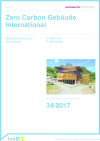
Begleitmessung und Auswertung
Schriftenreihe
34/2017
R. Wimmer, S. Eikemeier
Herausgeber: BMVIT
Deutsch, 60 Seiten
Downloads zur Publikation
Zukunftsweisende industrielle Energietechnologien
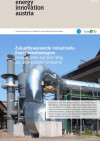
Innovationen auf dem Weg zur "low carbon"-Industrie
energy innovation austria
1/2018
Herausgeber: BMVIT und Klima- und Energiefonds
Deutsch, 8 Seiten
Downloads zur Publikation
Kapazitätsanpassung der Bauwirtschaft für eine erhöhte Sanierungsrate
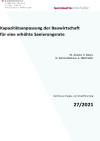
Die notwendige Erhöhung der Sanierungsleistung wird angesichts der weiterhin guten Auftragslage im Neubau nur mit einer Ausweitung der Kapazitäten der Bau- und Bauproduktewirtschaft zu erreichen sein. Dies hat große Auswirkungen auf den Arbeitsmarkt und bietet die Chance für strategische Weichenstellungen, stößt allerdings auch auf Barrieren.
Schriftenreihe
27/2021
W. Amann, S. Goers, N. Komendantova, A. Oberhuber
Herausgeber: BMK
Deutsch, 94 Seiten
Downloads zur Publikation
Ergebnisband „Klimaneutrale Städte"
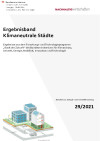
Der vorliegende Ergebnisband stellt abgeschlossene Projekte aus dem Forschungs- und Technologieprogramm „Stadt der Zukunft“ des Bundesministeriums für Klimaschutz, Umwelt, Energie, Mobilität, Innovation und Technologie (BMK) im Bereich Klimaneutrale Städte vor. Die gewonnenen Erkenntnisse sollen eine Entwicklung in Richtung energieeffiziente und klimaverträgliche Stadt unterstützen, die auch dazu beiträgt, die Lebensqualität und die wirtschaftliche Standortattraktivität zu erhöhen.
Schriftenreihe
29/2021
Redaktionelle Gestaltung: Bianca Pfefferer, Hannes Warmuth (ÖGUT)
Herausgeber: BMK
Deutsch, 22 Seiten
Downloads zur Publikation
Forschungsforum Mobilität für Alle 2015
3. Dezember 2015
Austria Trend Hotel Savoyen Vienna, Rennweg 161030 Wien, AT
Die Veranstaltung war dem Thema “Mobilität und Wohnen” gewidmet und gab Einblick in gesellschaftliche Trends und aktuelle Forschungsergebnisse, unter anderem zum Zusammenhang von Wohnstandort und Mobilitätsverhalten. Innovative Lösungsansätze für nachhaltige Mobilität wurden aufgezeigt.
Workshop: Neue Wärme- und Kältetechnologien für das Zukunftsquartier
Das Klimaschutzministerium und die VÖPE engagieren sich gemeinsam für den Wissenstransfer zwischen Forschung und Developer-Praxis, aktuell mit einem Workshop für VÖPE Mitglieder.
Bewertung der Bauteilaktivierung als Option für Flexibilität im Strommarkt
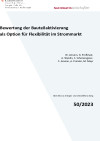
Um die Forschungsfrage dieser Studie nach dem zukünftigen Stellenwert der Bauteilaktivierung für die Energieversorgung zu beantworten, wurde ein Schätzmodell zum erwartbaren Neubau von Wohn- und Dienstleistungsbauten bis 2040 sowie der Sanierung von Bestandsbauten entwickelt.
Schriftenreihe
50/2023
W. Amann, G. Preßmair, A. Stipsits, S. Schoisengeier, C. Amann, A. Preisler, M. Mayr
Herausgeber: BMK
Deutsch, 75 Seiten
Downloads zur Publikation
Dialogforum "Klimaneutrale Stadt"
20. November 2023
Ankersaal, Brotfabrik, Absberggasse 27, 1100 Wien
Mit der Mission „Klimaneutrale Stadt“ unterstützt das Klimaschutzministerium in Kooperation mit dem Klima- und Energiefonds österreichische Städte dabei, durch Forschung und Entwicklung schneller klimaneutral zu werden. Pionierstädte gehen gemeinsam voran und entwickeln praxistaugliche, klimawirksame Lösungen für die Energie- und Mobilitätswende sowie die Kreislaufwirtschaft, die rasch umgesetzt und verbreitet werden sollen.
Breakfast Lounge BAU!MASSIV!
19. Juni 2018
Dachgeschoß Haus des Meeres, Fritz-Grünbaum-Platz 1, Wien, AT
Nach dem Vortragsprogramm rund um Energie-, Umwelt- und Nachhaltigkeitsthemen zu Bauen und Wohnen, erwartet Sie die Keynote von Stefan Schleicher "Welche Zukunft für Energie und Klima?" und die Vorstellung der Studienergebnisse der BAU!MASSIV! Forschungsinitiative "Zukunftssicheres Bauen 2015-2017".
OPEN HEAT GRID - Offene Wärmenetze in urbanen Hybridsystemen
Primäres Forschungsthema von OPEN HEAT GRID war die Untersuchung der Möglichkeiten zur Forcierung der Einspeisung industrieller Abwärme in bestehende Fernwärmenetze. Die Projektergebnisse zeigen, dass Abwärme nicht kostenlos ist: trotz minimaler variabler Kosten müssen sich die Investitionskosten in üblichen Amortisationszeiten rechnen. Die Analyse zeigt, dass es keiner staatlichen Regelung im Sinne einer Einspeiseverpflichtung oder Marktliberalisierung bedarf. Jedoch liegen aus ökonomischer Sicht Informationsasymmetrien vor, wodurch es möglich ist, dass rationale Entscheidungen nicht zustande kommen.
Mit Klimaschutz zum Unternehmenserfolg? Clean-Tech als Chance für heimische Wirtschaft
29. November 2016, 17.30 Uhr
Austria Wirtschaftsservice Gesellschaft mbH, Walcherstraße 11A, 1020 Wien
Diskutieren Sie mit uns und internationalen Expertinnen über die Klimaschutz-Herausforderungen sowie die notwendigen Maßnahmen. Lernen Sie spannende Unternehmen und Problemlösungen kennen.
HEROES - Houses for Energy- and ResOurce Efficient Settlements
A simplified method will be developed for the calculation of environmental indicators for so far not considered building elements (eg. constructions, which are not thermally relevant and HVAC-components). The theoretical principles for the calculation of the primary energy demand and the CO2-Emissions for operating and raising a building will be harmonized.
Universitätslehrgang: Nachhaltiges Bauen
Lehrgangsstart: 5. November 2020
Wien & Graz
Der postgraduale, berufsbegleitende Universitätslehrgang Nachhaltiges Bauen vermittelt ökologische, ökonomische sowie soziokulturelle Aspekte beim Planen, Bauen und Nutzen von Gebäuden.
Ergebnisband „Gebäudetechnologien“
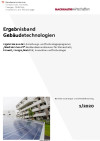
Der vorliegende Ergebnisband stellt abgeschlossene Projekte aus dem Forschungs- und Technologieprogramm „Stadt der Zukunft“ des Bundesministeriums für Klimaschutz, Umwelt, Energie, Mobilität, Innovation und Technologie (BMK) im Bereich innovativer Gebäudetechnologien vor. Die gewonnenen Erkenntnisse sollen eine Entwicklung in Richtung energieeffiziente und klimaverträgliche Stadt unterstützen, die auch dazu beiträgt, die Lebensqualität und die wirtschaftliche Standortattraktivität zu erhöhen.
Schriftenreihe
1/2020
Redaktionelle Gestaltung: Bianca Pfefferer, Hannes Warmuth (ÖGUT)
Herausgeber: BMK, Aktualisierung: Mai 2021
Deutsch, 25 Seiten
Downloads zur Publikation
Mission Innovation Austria Online Event: Energiegemeinschaften aus Kundensicht
27. Mai 2020
Online
Energiegemeinschaften rücken immer mehr in den Brennpunkt. An deren technischer Umsetzung wird bereits intensiv gearbeitet. Wie aber reagieren KundInnen darauf? Welche Erfahrungen gibt es bereits und welche Herausforderungen zeichnen sich aus dieser Perspektive ab? Ein Rückblick auf das 3. Innovator Circle-Event von Green Energy Lab im Rahmen der MIA Online-Eventreihe.
12. Internationale Energiewirtschaftstagung 2021 (IEWT 2021) - Das Energiesystem nach Corona: Irreversible Strukturänderungen?
8. - 10. September 2021
Karlsplatz 13 / Online, Wien, AT
Die 12. IEWT steht im Zeichen der von der Covid-19 Pandemie ausgelösten aktuellen Fragen der Disruptionen des Energiesystems. Sie beschäftigt sich mit den Auswirkungen der Pandemie auf eben dieses und dem damit einhergehenden notwendigen Strukturwandel sowie allen anderen wesentlichen Themen, die damit zusammenhängen.
Universitätslehrgang: Nachhaltiges Bauen
21. Oktober 2021
Operngasse 11/017, 1040 Wien, AT
Der postgraduale, berufsbegleitende Universitätslehrgang Nachhaltiges Bauen vermittelt ökologische, ökonomische sowie soziokulturelle Aspekte beim Planen, Bauen und Nutzen von Gebäuden.
Technologiereport: Digitalisierung der Bau- und Immobilienbranche
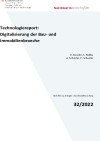
In der Vielzahl digitaler Möglichkeiten ist es nur sehr schwer möglich, einen Überblick zu behalten, Trends und Potentiale abzuschätzen sowie Zusammenhänge zu erkennen. Der vorliegende Report zielt daher darauf ab, den aktuellen Stand der Technik und die Markteinschätzung vielversprechender digitaler Technologien zu beschreiben. Es werden Informationen über konkrete Anwendungsfälle, Mehrwert und Herausforderungen der jeweiligen Technologien bereitgestellt. Die dargestellten Analysen dienen der Potentialbewertung und der strategischen Weichenstellung zur Integration der aktuell wichtigsten digitalen Technologien der Bau- und Immobilienbranche.
Schriftenreihe
32/2022
K. Künzler, S. Robbi, A. Schuster, P. Schuster
Herausgeber: BMK
Deutsch, 92 Seiten
